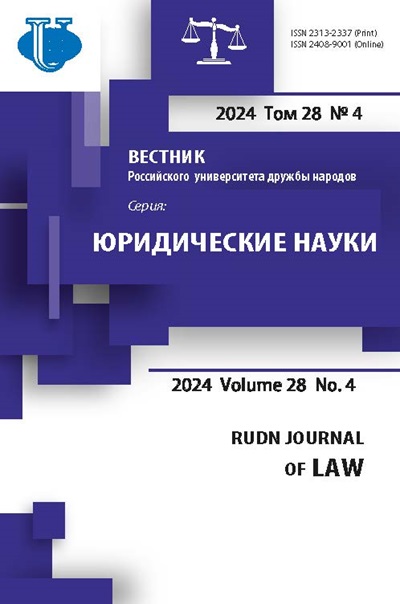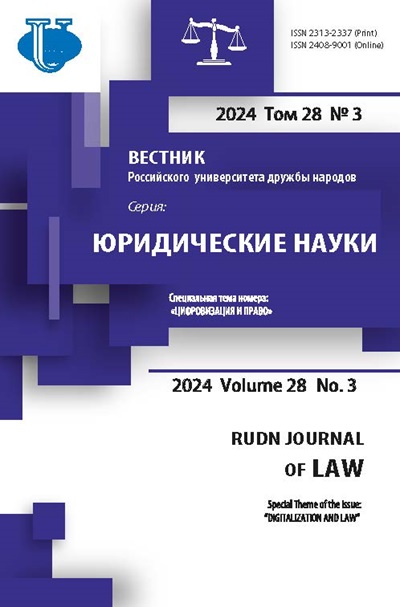Legal issues of digital citizenship
- Authors: Gavrilova Y.A.1, Bokov Y.A.1
-
Affiliations:
- Volgograd State University
- Issue: Vol 28, No 3 (2024): DIGITALIZATION AND LAW
- Pages: 546-564
- Section: LAW AND DIGITAL TECHNOLOGIES
- URL: https://journals.rudn.ru/law/article/view/40935
- DOI: https://doi.org/10.22363/2313-2337-2024-28-3-546-564
- EDN: https://elibrary.ru/GQDGDO
Cite item
Full Text
Abstract
The artile examines the phenomenon of digital citizenship in legal science. Interest in digital citizenship is driven by the rapid development of digital society and technology, radical transformations of individuals’s identity and legal culture in this era, ambiguity between universal and national understanding of digitalization, interdisciplinary disagreement in scientific views on this phenomenon, and its varying sectoral legal interpretations. The purpose of the study is to identify the legal issues of digital citizenship as a direct subject of study for legal science. Methods applied include formal-legal, socio-legal, concrete sociological, comparative legal, statistical, modeling, forecasting, and cultural studies. Three of the most relevant legal issues of digital citizenship are examined as a legal construct, a comprehensive legal institution, and a distinct phenomenon of modern legal culture. The legal construct of digital citizenship allows for the generalization of typical elements of diverse phenomena and situations united by the attribute “digital” in a citizen’s life. Elements of the digital citizenship construct are proposed as follows: digital education, digital literacy competence, digital identity, digital thinking and digital behavior. A comprehensive legal institution of digital citizenship will ensure the unity of scientific, legislative and applied approaches in precise and effective legal regulation of all areas of public life where digital technologies are integrated. The comprehensive legal institution of digital citizenship may include institutions of e-democracy and e-voting, e-business, e-government, e-justice, and others. Digital citizenship as a phenomenon of legal culture can be measured using quantitative and qualitative methods, reflecting the level of a citizen’s digital maturity through established legal knowledge, skills, values, reflection, and practical experience in the digital environment.
About the authors
Yulia A. Gavrilova
Volgograd State University
Author for correspondence.
Email: gavrilova_ua@volsu.ru
ORCID iD: 0000-0002-8055-4710
Candidate of Legal Science, Associate Professor of the Department of Philosophy and Theory of Law, Law Institute
100 Universitetsky ave., Volgograd, 400062, Russian FederationYuri A. Bokov
Volgograd State University
Email: bokov@volsu.ru
ORCID iD: 0000-0001-6357-9599
Candidate of Legal Science, Associate Professor of the Department of Constitutional and Municipal Law, Law Institute
100 Universitetsky ave., Volgograd, 400062, Russian FederationReferences
- Alsaadi, M., Alharassi, N., Alsalmi, J. & Alkindi, S. (2023) The Practices of Digital Citizenship Among Undergraduates at Sultan Qaboos University in Oman During COVID-19. In: Al Naimiy, H.M.K., Bettayeb, M., Elmehdi, H.M. & Shehadi, I. (eds.). Future Trends in Education Post COVID-19. SHJEDU 2022. Springer, Singapore. pp. 281-294. https://doi.org/10.1007/978-981-99-1927-7_22
- Bogdanova, D.A. & Burkatovskaya, G.R. (2017) From Internet risks to digital citizenship. Public education. 1464(8), 147-153. (in Russian).
- Bokov, Y.A. & Abezin, D.A. (2020) Digital Citizenship: Implementation in the Modern World. In: Inshakova, A. & Inshakova, E. (eds.). Competitive Russia: Foresight Model of Economic and Legal Development in the Digital Age. CRFMELD 2019. Lecture Notes in Networks and Systems. Vol. 110. Springer, Cham. pp. 442-448. https://doi.org/10.1007/978-3-030-45913-0_52
- Bombardelli, O. (2021) Digital Citizenship and Life Long Learning. In: Auer, M. & May, D. (eds.). Cross Reality and Data Science in Engineering. REV 2020. Advances in Intelligent Systems and Computing. Vol. 1231. Springer, Cham. pp. 817-826. https://doi.org/10.1007/978-3-030-52575-0_67
- Brodovskaya, E.V. (2019) Digital citizens, digital citizenship and digital citizenship. Power. 27(4), 65-69. https://doi.org/10.31171/vlast.v27i4.6587 (in Russian).
- Bronnikov, I.A. & Karpova, V.V. (2021) Digital citizenship in the Russian Federation: political risks and prospects. Bulletin of Volgograd State University. Episode 4: History. Regional studies. International relationships. 26(3), 123-133. https://doi.org/10.15688/jvolsu4.2021.3.11 (in Russian).
- Chapman, A.L. (2023) (Digital) Citizenship: Dissenting from Indifference. Social Media for Civic Education. Palgrave Studies in Educational Media. Palgrave Macmillan, Cham. pp. 93-103. https://doi.org/10.1007/978-3-031-10865-5_6/
- Cherdantsev, A.F. (1993) Logical and linguistic phenomena in law, legal science and practice. Yekaterinburg, Nauka Publ. (in Russian).
- Christensen, I.R., Biseth, H. & Huang, L. (2021) Developing Digital Citizenship and Civic Engagement Through Social Media Use in Nordic Schools. In: Biseth, H., Hoskins, B. & Huang, L. (eds.). Northern Lights on Civic and Citizenship Education. IEA Research for Education. Vol. 11. Springer, Cham. pp. 65-92. https://doi.org/10.1007/978-3-030-66788-7_4
- Chukwuere, J.E. & Munapo, E. (2023) Factors Influencing the Development of Digital Citizenship on Social Media Platforms: Narrative Review. In: Vasant, P., Weber, GW., Marmolejo-Saucedo, J.A., Munapo, E. & Thomas, J.J. (eds.). Intelligent Computing & Optimization. ICO 2022. Lecture Notes in Networks and Systems. Vol. 569. Springer, Cham. pp. 1007-1015. https://doi.org/10.1007/978-3-031-19958-5_94
- Chun, W.S.D., Yau, S.H., Chan, W.M. & Leung, C.Y. (2023) Bridging the Gap Between Digital Divide and Educational Equity by Engaging Parental Digital Citizenship and Literacy at Post-Covid-19 Age in the Hong Kong Context. In: TSO, A.W.B., NG, S.K.K., LAW, L., BAI, T.S. (eds.). The Post-pandemic Landscape of Education and Beyond: Innovation and Transformation. HKAECT 2022. Educational Communications and Technology Yearbook. Springer, Singapore. pp. 165-182. https://doi.org/10.1007/978-981-19-9217-9_11
- Dabner, N. (2019) Digital Citizenship: A Sociocultural Snapshot. In: Tatnall, A. (ed.). Encyclopedia of Education and Information Technologies. Springer, Cham. pp. 1-5. https://doi.org/10.1007/978-3-319-60013-0_179-1
- Degtyarenko, K.A. & Kirko, V.I. (2023) Digital policy of China: digital image of the national state. Digitalization. 4(4), 8-25. (in Russian).
- Egupova, M.A. & Egupov, A.V. (2023) Digital Political Rights as New Reality in Digital PublicLaw Space. South-Russian Journal of Social Sciences. 24(2), 65-77. https://doi.org/10.31429/26190567-24-2-65-77 (in Russian).
- Ershova, I.V. & Enkova, E.E. (2022) Digital maturity as an indicator of the success of digital transformation of a university. Bulletin of the University named after O.E. Kutafina (MSAL). 100(12), 20-29. https://doi.org/10.17803/2311-5998.2022.100.12.020-029 (in Russian).
- Gadzhieva, A.О. (2023) Electronic Voting Technologies in Elections: Russian and Foreign Experience. RUDN Journal of Law. 27(3), 649-669. https://doi.org/10.22363/2313-2337-2023-27-3-649-669 (in Russian).
- Garkusha, V.N. (2023) Digital civilization, digital thinking and digital culture. Information-Communication-Society. (1), 55-59. (in Russian).
- Gavrilova, Yu.A. (2023) The Constitutionalization of information security in Russian Law: improving the theoretical model. RUDN Journal of Law. 27(1), 97-116. https://doi.org/10.22363/2313-2337-2023-27-1-97-116 (in Russian).
- Isakov, I.N. (2023) New technologies in law as a highly effective means of implementing the constitutional principle of equality in conditions of multi-level legal regulation. RUDN Journal of Law. 27(4), 919-938. https://doi.org/10.22363/2313-2337-2023-27-4-919-938 (in Russian).
- Kravets, I.A. (2023) Digital citizenship and constitutional challenges in the information and algorithmic society. Comparative constitutional review. 153(2), 93-123. https://doi.org/ 10.21128/1812-7126-2023-2-93-123 (in Russian).
- Mamlok, D. (2021) Advancing Digital Citizenship. The Great Promise of Educational Technology. New Frontiers in Education, Culture, and Politics. Palgrave Macmillan, Cham. pp. 155-167. https://doi.org/10.1007/978-3-030-83613-9_9
- Morales, N.J.M., Mieles, V.D.P., Ibáñez, D.B. & Lagos, C.P. (2020) Digital Citizenship and Participation Through Twitter: The Case of Provincial Capital Municipalities in Ecuador (2009-2019). In: Rocha, Á., Ferrás, C., Montenegro Marin, C. & Medina García, V. (eds.). Information Technology and Systems. ICITS 2020. Advances in Intelligent Systems and Computing. Vol. 1137. Springer, Cham. pp. 681-692. https://doi.org/10.1007/978-3-030-40690-5_65
- Örtegren, A. (2024) Philosophical underpinnings of digital citizenship through a postdigital lens: Implications for teacher educators’ professional digital competence. Educ Inf Technol. 29, 4253-4285. https://doi.org/10.1007/s10639-023-11965-5
- Panasyuk, V.P., Monakhova, L.Yu. & Sherayzina, R.M. (2023) Digital maturity of an individual as an assessment of his digital competence: types and levels. Person and Education. 76(3), 110-118. (in Russian).
- Polenina, S.V. (1975) Complex legal institutions and the formation of new branches of law. Jurisprudence. (3), 71-79. (in Russian).
- Pyrma, R.V. (2019) Political facets of digital citizenship. Power. 27(4), 69-78. https://doi.org/10.31171/vlast.v27i4.6588 (in Russian).
- Rusakova, E.P. (2023) The application of artificial intelligence in the civil proceedings of the People’s Republic of China: theoretical and legal analysis. RUDN Journal of Law. 27(2), 468-480. https://doi.org/10.22363/2313-2337-2023-27-2-468-480 (in Russian).
- Shamrin, M.Yu. & Galkina, M.V. (2023) The role of blockchain in improving public administration. RUDN Journal of Law. 27(4), 956-968. https://doi.org/10.22363/2313-2337-2023-27-4-956-968 (in Russian).
- Third, A., Collin, P., Walsh, L. & Black, R. (2019) Digital Citizenship. Young People in Digital Society. Studies in Childhood and Youth. Palgrave Macmillan, London. pp. 175-219. https://doi.org/10.1057/978-1-137-57369-8_5
- Vlasenko, N.A. (2013) Logical and linguistic requirements for legal constructions. Legal technique. (7-2), 164-167. (in Russian).
















